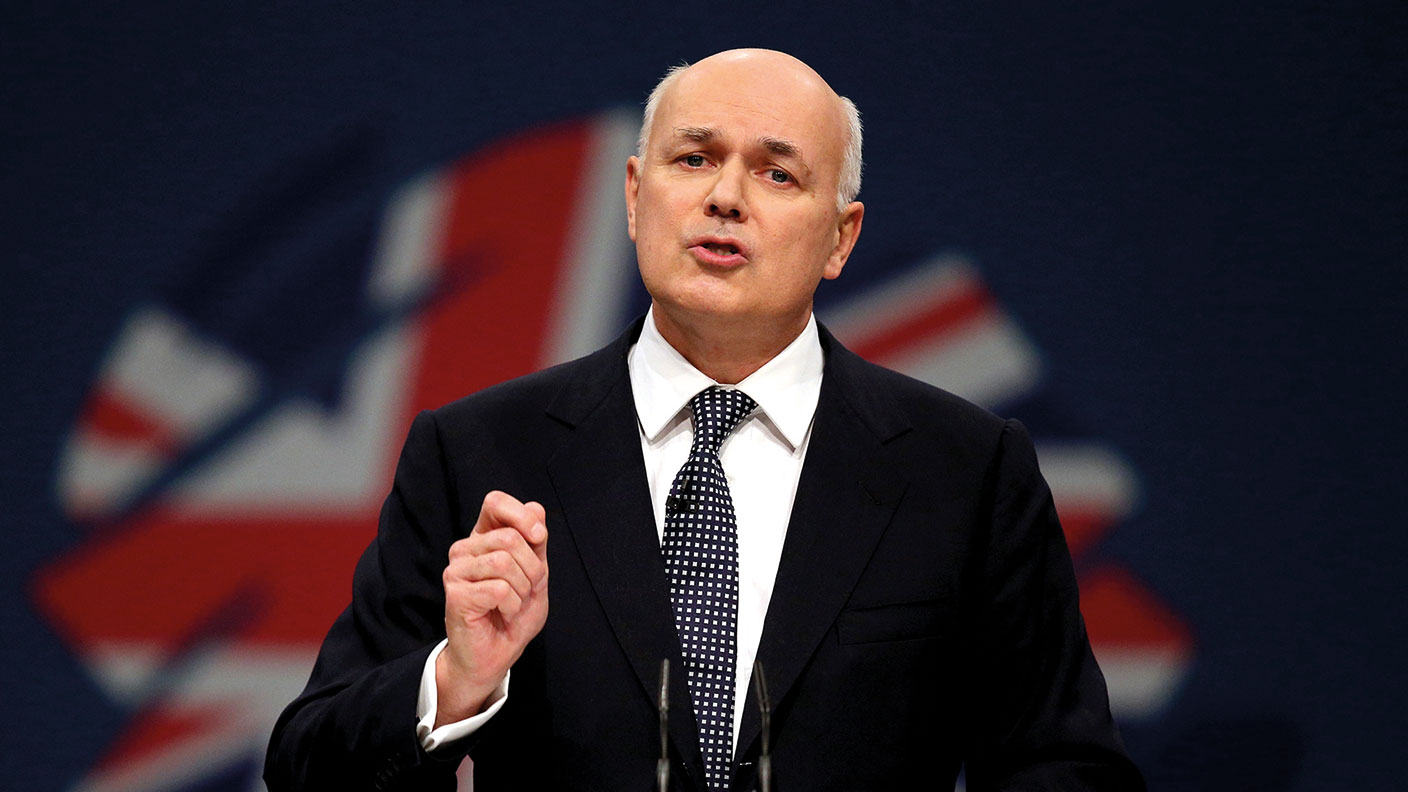Universal Credit comes good
The government’s benefit reforms have been plagued with disasters since their introduction in 2013. The Covid-19 crisis, however, has revealed a positive side.


Get the latest financial news, insights and expert analysis from our award-winning MoneyWeek team, to help you understand what really matters when it comes to your finances.
You are now subscribed
Your newsletter sign-up was successful
Want to add more newsletters?

Twice daily
MoneyWeek
Get the latest financial news, insights and expert analysis from our award-winning MoneyWeek team, to help you understand what really matters when it comes to your finances.

Four times a week
Look After My Bills
Sign up to our free money-saving newsletter, filled with the latest news and expert advice to help you find the best tips and deals for managing your bills. Start saving today!
What is Universal Credit?
It’s the Conservatives’ flagship welfare reform, rolling up six existing forms of state welfare payments – including jobseekers’ allowance, housing benefit and child tax credits – into one single monthly payment. The aim of the reform, first announced in 2011 and still not completed, is to simplify the welfare system in order to help claimants and cut fraud, and to encourage work. The basic principle of the UC system is to cut out incentives for people to stay on benefits rather than accept work, and make it easier for them to access what they are entitled to. In February, more than 2.8 million people were in receipt of UC, which is being phased in over a period of years as people’s individual circumstances change.
Just how many years?
It’s been a painfully slow business. UC was first introduced in 2013 and was originally supposed to be fully rolled out by April 2017, but it has been plagued by a series of technical problems and widespread concerns – across the political spectrum – over some of its unintended consequences. Championed by Iain Duncan Smith (the Tory work and pensions secretary 2010-2016), it was originally conceived as a more generous scheme than those it’s replacing. However, its introduction crashed into George Osborne’s austerity cuts, making it less attractive overall, and less effective at incentivising work. In addition, a succession of embarrassing failures of management and IT caused years of delays and endless examples of claimants treated harshly under the new rules. Most recently, in February this year the government delayed the full rollout by a further nine months to September 2024, adding a further £500m to the costs of transitioning claimants to the new system over the next five years.
What went wrong?
In particular, the five-week wait between claiming and receiving money proved disastrous, given that many low-earners have no savings or other resources, and are paid weekly. The areas where UC was brought in typically saw surges in the use of food banks, spikes in rent arrears and evictions. Landlords, who once saw claimants as ideal tenants, now refused to let to them. But rather than adapt the system, a 2018 report by the National Audit Office found that the Department for Work & Pensions had failed to react to the mounting evidence of hardship and systemic failure, and instead became “defensive, insensitive and dismissive”. The spending watchdog concluded, witheringly, that “the larger claims for universal credit, such as boosted employment, are unlikely to be demonstrable at any point in the future. Nor for that matter will value for money.”
MoneyWeek
Subscribe to MoneyWeek today and get your first six magazine issues absolutely FREE

Sign up to Money Morning
Don't miss the latest investment and personal finances news, market analysis, plus money-saving tips with our free twice-daily newsletter
Don't miss the latest investment and personal finances news, market analysis, plus money-saving tips with our free twice-daily newsletter
What’s happened this year?
Despite all this, the UC system – faced with a sudden and dramatic surge in demand – has held up astonishingly well. In early March, there were around 2.8 million people claiming UC, around a third of the projected total once the transition is complete. But within four weeks of lockdown that had leapt 40% to four million. By 9 July the UC system had doubled to 5.6 million claimants. The peak of the technical and staffing challenge was the night of 26 March, when Rishi Sunak announced his income support scheme for the self-employed, which helped basic-rate taxpayers, but not until June. In a normal week, the UC system handles 12,000 new claims. That night alone, it handled 136,000.
And the system didn’t crash?
No, it did “remarkably well”, says Rosie Kinchen in The Sunday Times. More than 90% of payments due were paid in full and on time. Most advances were paid within 72 hours. “It was like laying tarmac in front of the traffic while it was moving very fast behind us,” says Neil Couling, director of UC. “The old system would just have collapsed.” From March, the government boosted weekly payments by £20 and (until August) removed the stipulation that UC claimants must be seeking work – thereby encouraging take up, and arguably turning universal credit into a kind of emergency universal basic income. A survey by the Resolution Foundation shows that 46% of the new claimants were still in work, and another 12% earning while furloughed, and 27% self-employed. New claimants were typically better off (pre-pandemic) than the usual claimants and were far more likely to be private renters or homeowners.
What went right?
Agile thinking and a can-do attitude, says Kinchen. Within weeks of lockdown, the DWP reallocated 10,000 staff from other sections such as the Passport Office; they supplied 20,000 laptops so staff could work from home; and they shifted to a “don’t call us, we’ll call you” system of calling people back, not leaving them on hold. They also softened security checks to speed up the system (while admittedly increasing the risk of fraud). The result is that 74% of new claimants report a positive experience of UC. Compared with mounting fury over the government’s inability – six months on – to organise a coherent testing system, the performance of the UC system is one of the bright spots of the pandemic.
So what happens now?
Flaws remain, but the pandemic has shown a positive side to the new system. The question is whether public appreciation will prove durable once the furlough scheme ends, which is expected to lead to a spike in unemployment, leaving many dependent on benefits for the first time. “Coming into the crisis, the UK’s social-security system provided fairly low levels of income replacement, the logic being that, given the UK’s fast-moving jobs market, jobseekers would be able to find work quickly, and indeed would have a strong incentive to do so,” says Karl Handscomb of the Resolution Foundation. The Covid crisis has upended that assumption. If the pandemic’s effects do prove deep and damaging, this Covid bright spot may turn into a running sore.
Get the latest financial news, insights and expert analysis from our award-winning MoneyWeek team, to help you understand what really matters when it comes to your finances.
Simon is the chief leader writer and columnist at The Times and previous to that, he was at The Wall Street Journal for 9 years as the chief European commentator. Simon also wrote for Reuters Breakingviews as the Executive Editor earlier in his career. Simon covers personal finance topics such as property, the economy and other areas for example stockmarkets and funds.
-
 Should you buy an active ETF?
Should you buy an active ETF?ETFs are often mischaracterised as passive products, but they can be a convenient way to add active management to your portfolio
-
 Power up your pension before 5 April – easy ways to save before the tax year end
Power up your pension before 5 April – easy ways to save before the tax year endWith the end of the tax year looming, pension savers currently have a window to review and maximise what’s going into their retirement funds – we look at how
-
 "Botched" Brexit: should Britain rejoin the EU?
"Botched" Brexit: should Britain rejoin the EU?Brexit did not go perfectly nor disastrously. It’s not worth continuing the fight over the issue, says Julian Jessop
-
 'AI is the real deal – it will change our world in more ways than we can imagine'
'AI is the real deal – it will change our world in more ways than we can imagine'Interview Rob Arnott of Research Affiliates talks to Andrew Van Sickle about the AI bubble, the impact of tariffs on inflation and the outlook for gold and China
-
 Tony Blair's terrible legacy sees Britain still suffering
Tony Blair's terrible legacy sees Britain still sufferingOpinion Max King highlights ten ways in which Tony Blair's government sowed the seeds of Britain’s subsequent poor performance and many of its current problems
-
 How a dovish Federal Reserve could affect you
How a dovish Federal Reserve could affect youTrump’s pick for the US Federal Reserve is not so much of a yes-man as his rival, but interest rates will still come down quickly, says Cris Sholto Heaton
-
 New Federal Reserve chair Kevin Warsh has his work cut out
New Federal Reserve chair Kevin Warsh has his work cut outOpinion Kevin Warsh must make it clear that he, not Trump, is in charge at the Fed. If he doesn't, the US dollar and Treasury bills sell-off will start all over again
-
 How Canada's Mark Carney is taking on Donald Trump
How Canada's Mark Carney is taking on Donald TrumpCanada has been in Donald Trump’s crosshairs ever since he took power and, under PM Mark Carney, is seeking strategies to cope and thrive. How’s he doing?
-
 Rachel Reeves is rediscovering the Laffer curve
Rachel Reeves is rediscovering the Laffer curveOpinion If you keep raising taxes, at some point, you start to bring in less revenue. Rachel Reeves has shown the way, says Matthew Lynn
-
 The enshittification of the internet and what it means for us
The enshittification of the internet and what it means for usWhy do transformative digital technologies start out as useful tools but then gradually get worse and worse? There is a reason for it – but is there a way out?
